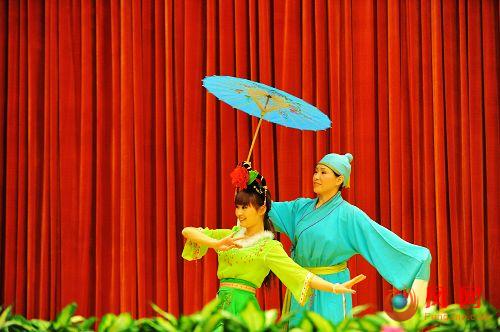
Flower-drum Opera, or "Carrying Scent Load", is a local opera originated in the countryside of many regions. Its main accompaniment instruments include Suona Horn, pipe, drum, gong, etc. Flower-drum Opera is very popular with the local people in Hunan, Hubei, Anhui, Guangdong and other provinces.
As Flower-drum Opera takes rural life as the subject matter and its melody is stemmed from ballads, folk songs, hums, work songs and Taoist music, it is featured by lively melody, pithy plot and dialect-style singing. Featuring intense rustic traits, repertoires of Flower-drum Opera mainly reflect laboring activities, love, family conflicts and other contents in folk life.
Performing forms of Flower-drum Opera were fixed in the Qing Dynasty to be cored with three roles: Dan (the female character type), Sheng (the young male character type) and Chou (clown). Flower-drum Opera at the initial stage was a life-oriented playlet cored with folk chansons. In later period, repertoires focusing on folk legends with strong narrative nature came into existence.
Flower-drum Opera has undergone flourishing development after the founding of People's Republic of China. The most typical Hunan Flower-drum Opera has been developed for over 200 years and now is provided with more than 300 types of melodies. Moreover, a large number of traditional repertoires such as Woodcutter Liuhai and Liuhai Playing with Gold Hoptoad have been coordinated and adapted. At the same time, numerous modern dramas such as the popular play Tinker Pans were created. The initial heroine of the play is the later famous soprano singer Li Guyi. As a playlet taking root in folk life, Flower-drum Opera has been experiencing continuous improvement under the joint efforts of old and newly-arising artists.
